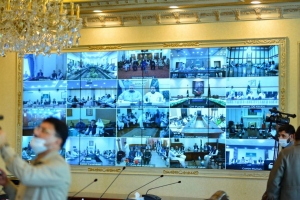Summary
Pakistan’s 18th Amendment, passed in 2010, allocates health as a provincial subject and any talk of altering the mandate of the Amendment has usually been met with vociferous opposition from the provincial governments. This, together with the lack of legislations related to pandemic and infectious diseases, misalignment of policies and priorities and the resultant reliance on the army has posed major governance, coordination and political problems.
In Pakistan, which has so far reported over 260,000 COVID-19 cases and 5,500 related deaths, concerns have been raised over the efficacy of existing legal instruments to combat the spread of the pandemic.
The main statute addressing communicable diseases is a nominal revision of the colonial legal artefact Epidemic Diseases Act, 1897, which is vague, short and outdated. This statute allows the federal government to inspect any ship or vessel leaving or arriving at any port in Pakistan in order to prevent the outbreak or the spread of a disease. The ambit of the legislation is limited and in fact makes no mention of airports.
There are a number of ways in which Pakistan can issue urgent laws needed to address the pandemic. A Proclamation of Emergency is one option, which the Constitution has made permissible under extraneous circumstances. A formal proclamation specifically to address the pandemic, however, poses numerous hurdles. Emergency provisions in the document do not specifically address public health emergencies in any specific detail. They relate mostly to war, financial emergencies, restoring public order, containing internal disturbances and suspending fundamental rights.
The goal of these constitutional provisions is predominantly to provide a legal cover for centre interventions into provincial affairs. Article 232-2, for instance, states that while a Proclamation of Emergency is in force, the federal parliament has the power to make laws for a province and take over provincial powers. The Article also states that the federal government can assume all or any of the functions of the government of the province while Article 234 allows the Pakistan president to assume the role of the governor of the province in crises.
These provisions spotlight a major source of political and constitutional contention in the country. A fraught history of centre-province relations has meant that provincial autonomy is a recurring point of contestation in Pakistan. The 18th Amendment, passed in 2010, allocates health as a provincial subject and any talk of altering the mandate of the Amendment has usually been met with vociferous opposition from the provincial governments. The 18th Amendment, together with the lack of guiding legislations related to epidemics and infectious diseases, ensures that the provincial governments possess considerable independence in combating the virus. However, a misalignment of policies and priorities between the centre and the provinces has posed major governance, coordination and political problems.
While the provincial governments, particularly in Sindh, have led a cautious approach to the pandemic, the federal government has often downplayed the severity of the virus. Indeed, at the outset of the crises, Prime Minister Imran Khan resisted the imposition of a lockdown and likened the health effects of the new virus to a mild flu. His outlook on the pandemic has sent mixed signals on the importance of lockdowns and undermined the efforts of the provincial governments to place effective restrictions on social and public gatherings. Khan’s indecision has resulted in an absence of legislation to align centre-province priorities and maintain a cohesive national agenda.
The federal government’s chosen method to issue law during the pandemic has been to use Article 89 of the Constitution to promulgate presidential ordinances pertaining to smaller and specific issues such as hoarding food or smuggling goods. These laws enact punitive measures against those profiteering from the crises. These laws do not address broader public health issues of national significance.
Without a federal lead on the pandemic, the provincial governments have looked to the armed forces for support using Article 245 of the Constitution which allows the armed forces to act in aid of civil power when called upon to do so. The provincial governments have tried to bridge the legislative gap by issuing their own ad hoc laws (such as The Punjab Infectious Diseases [Prevention and Control] Ordinance 2020, Khyber Pakhtunkhwa Epidemic Control and Emergency Relief Ordinance 2020 and The Sindh Epidemic Diseases [Amendment] Ordinance, 2020) and relied on the National Disaster Management Authority (NDMA) Act, 2010 for assistance. The Act establishes the NDMA – a body run by an army general, which is responsible for coordinating the national COVID-19 response in Pakistan.
However, an overreliance on the armed forces has major consequences for Pakistan’s fraught civil-military relations and places added pressure on the country’s fragile democracy. It inflates the importance of the military at a time of crises, spotlights the ineptitude of the federal government, casts doubt on the democratic process and reignites questions about Pakistan’s federalism.
The absence of a comprehensive legislative plan in Pakistan has politicised the response to the pandemic. This, in turn, has impeded cooperative efforts between the centre and the provinces and produced a confused response to the unfolding crises. And in inducing the provincial governments to turn to the army, it has heightened insecurities about the armed forces’ influence in politics.
. . . . .
Dr Imran Ahmed is an Honorary Associate at the University of New England, New South Wales, Australia. He can be contacted at iahmed5@une.edu.au. The author bears full responsibility for the facts cited and opinions expressed in this paper.
Photo Credit: ImranKhanOfficial/Facebook
-
 More From :
More From :
-
 Tags :
Tags :
-
 Download PDF
Download PDF



